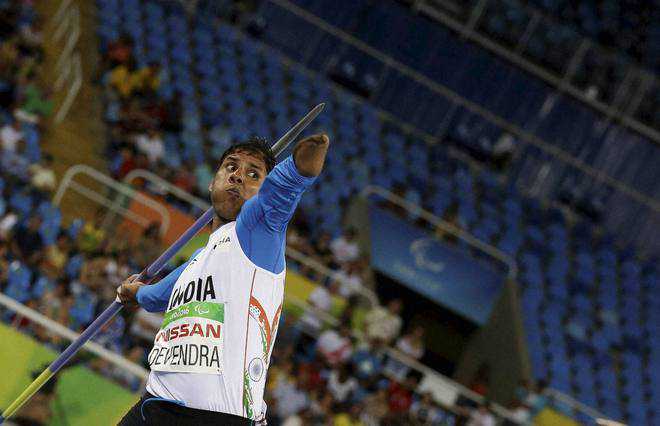Rio de Janeiro, September 14
Devendra Jhajharia of Rajasthan has become the most successful para-athlete from India, winning his second Paralympic Games gold medal in javelin throw. His second Paralympics gold came 12 years after his first — he had won the javelin title at the Athens Paralympics on September 21, 2004.
When he was just eight, Jhajharia suffered a horrible accident when, climbing up a tree, he accidentally touched a live electric wire. His left arm had to be amputated below the elbow. Jhajharia didn’t let that dishearten him. “When I looked around, I saw a lot of people who didn’t have arms or legs and I realised that I am lucky enough to have my right hand,” Jhajharia says.
Jhajharia, who belongs to Jaipuria Khalsa village in Churu district of Rajasthan, began to take part in para-athletics events in 1995. Nine years later, he won his first Paralympics gold in Athens.
Long gap
The 35-year-old did not feature in the previous two Paralympics as his event was not included in the Games programme in 2008 and 2012. But at Rio, he made up for all that. Jhajharia’s world record throw of 63.97 metres came in his third attempt, and he bettered his own mark of 62.15m that he had set at Athens in 2004.
To keep himself in shape and injury-free during his absence from the Paralympics, Jhajharia followed an intensive training regimen and rarely visited home — so much so that his two-year-old son Kavyan does not even recognise him. “He does not even know what father is like. Only his mom tells him by showing my photo, that that’s papa,” says Jhajharia.
Home support
Jhajharia said his mother Jivani Devi and wife Manju, a former national-level kabaddi player, played a big role in his success. “Since my childhood days, my mother kept me focused,” he says. “She told me ‘you concentrate on your sport, rest we will look after’. She would not even phone me all these days, thinking that I would get disturbed. She has so far kept on fulfilling my needs but never took anything in return.”
“My wife left kabaddi so she could take care of the family as I mostly stayed away. My father ensured that I get farm-fresh lentils and wheat even when I’m away,” he added.
Jhajharia thanked his personal coach Sunil Tanwar, a coach at Sports Authority of India centre at Hisar, for helping him, especially in overcoming a shoulder injury ahead of the Paralympics. “There were some special exercises (with resistance bands) that really helped in strengthening my muscles,” he says.
Jhajharia competes in the F46 classification, which is for field athletes with “upper limb(s) deficiency, impaired muscle power or impaired range of movement”.
Before the Paralympics, Jhajharia trained in Kuortane, Finland, from April to July. There he became friends with Kenyan thrower Julius Yego, whom he calls one of his biggest motivators. “He would tell me his story of penury, of how he slept on a broken cot and how he learnt javelin throw by watching YouTube,” says Jhajharia. “It was quite an inspiration. If he can achieve after so much of hardships, why can’t I. We would train for about seven hours. He would tell me I would surely win a gold in Rio. He went on to win a silver.”
— PTI, TNS
Champion says...
Nothing is impossible
If you have willpower, then nothing is impossible in this world. I won my first Paralympics medal in 2004 and now after 12 years, it is my dedication and hard work which have paid off. The feeling can’t be expressed in words... it’s like a dream come true. Although I broke the world record in 2004 too, this is something very, very special. I felt like successfully completing a mission
Staying focused
Maintaining the same focus at 23 and 35 has been quite tough. But getting another gold after a 12-year-long wait only sweetens the feeling
Hard work and dedication
I trained for four hours daily, two hours in the morning and two in the evening. But when I moved to Finland for training, we worked for about seven hours every day. This forced the authorities there to admit how hardworking Indians can be. So I can proudly say that this gold is the outcome of that hardwork and dedication
Perception is changing
Perception towards para athletes has changed over the years. The credit for that goes to the brilliant performances by the athletes, not only at the Paralympics but also at other tournaments like world championships
Happy with support
I want to credit this win to the government’s TOP scheme. With this kind of support, I am sure the country will produce many more Devendras. Corporate support is also important for athletes to succeed. I am grateful to Go Sports Foundation.
Unlock Exclusive Insights with The Tribune Premium
Take your experience further with Premium access.
Thought-provoking Opinions, Expert Analysis, In-depth Insights and other Member Only Benefits
Already a Member? Sign In Now










